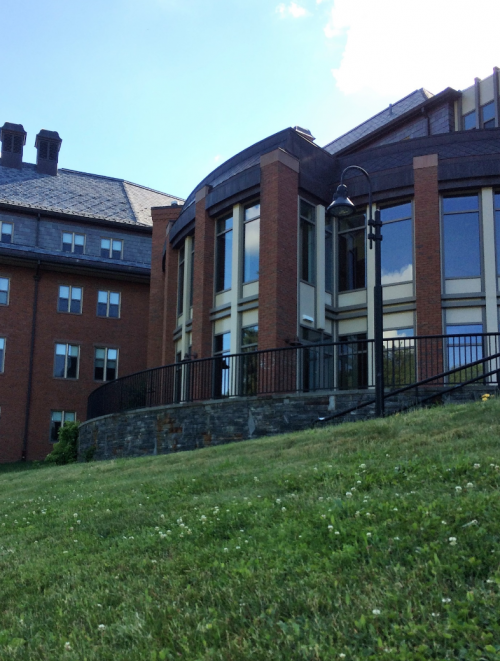Gordon Research Conference- Developmental Biology 25th-30th June, 2017
Posted by Sarah E Harrison, on 9 July 2017
As any early career researcher will know, attending your first big scientific meeting is a memorable event in your academic life. Last week, I was lucky enough to attend the Gordon Research Conference in Developmental Biology, held in sleepy South Hadley, two hours outside Boston, Massachusetts. For anyone who wasn’t local, the two hour drive from the airport to the conference site was an ordeal, but the welcome was worth it. The GRC ran an intensive scientific programme of seminars, discussion and poster sessions, held over five days. A Gordon Research Seminar (GRS) also ran over the weekend preceding the conference, exclusively for graduate students and postdocs to interact and present their research in a non-intimidating environment. Sessions spanned kingdoms, with researchers studying both animal and plant models. The themes were varied, and included evo-devo, organoids, and stem cells, as well as the usual suspects such as signalling and gene regulation.

In my opinion, running a conference with such a broad title was inspired. For a conference series where meetings often have very specific themes (browse through the list of past events on the GRC website and you will understand what I mean), running an event simply called ‘Developmental Biology’ drew people from all corners of the field. By keeping the title broad, no single mechanism or way of thinking dominated, and in fact several commonalities emerging in the talks were identified in the discussion. For example, the role of mechanical force in development was a recurring mechanism whether you worked on plants, Planarians or people! Perhaps the fact that this theme emerged despite no pre-meditated effort to select talks based around it, means it better reflects where the field is going and what questions are of interest to scientists.
Like at other GRCs, presentation of unpublished work was the star of the show. Speakers of all seniorities did a wonderful job of presenting new and exciting data and hypotheses, making a young researcher like me feel that I was learning things at the cutting edge.
The meeting was also useful to get feedback on published work too.
Publishing a paper can be a lonely experience. You spend years of your life perfecting and revising, then as soon as a manuscript is accepted and released you are left with an eerie silence, a vacuum, while the field digests the data. Apart from a smattering of mentions on social media, post-publication feedback from peers is virtually non-existent for biologists. Yet, when I arrived at the conference it was clear that people had read my paper. Some had even studied for their lab’s journal club! It meant something. Meetings such as the GRC give the community somewhere to exchange ideas. Not only are you there to present your research and absorb the work of others, but also to receive general and specific feedback from scientists across the community- who after all, are your target audience. Many of my most fruitful discussions and interactions happened over breakfast rather than during the seminar sessions themselves.
Several unsurprising topics kept cropping up in talk after talk. Developmental biologists have always been obsessed with pattern formation, and this is certainly not about to change. The field is moving towards computation, and molecular studies are becoming more and more sensitive as everyone who’s anyone seems to be doing single-cell RNA-seq!

Overall, the atmosphere at the meeting was friendly, fostering open discussion rather than feeling cliquey or competitive. Senior Professors and PhD students were free to interact, and did so. Talking about science, whether it was answering specific questions about my project, or talking about big challenges and how to approach them freed from the shackles of using a particular model organism, technique, or experimental design was fun!
By the end of the week, it is fair to say that the intense schedule began to take its toll, but everyone I spoke to was leaving having learned something, and having been surprised by something. To choose a single stand-out speaker would be impossible, but the quality of the talks were excellent. Even though the meeting was small, with perhaps fewer than one hundred attendees, the GRC did a great job at making researchers across disciplines feel part of the same community. The spirit of the conference was to share ideas, and I came away feeling inspired by people working in areas far removed from my own. After all, as developmental biologists, we are interested in the same fundamental questions, we just use different systems to answer them.


 (7 votes)
(7 votes)
Hi, thanks for this insightful post. I am leaving for my first Gordon Conference in less than two weeks and am super excited! This article helps me to get an idea what tp expect.
I had a somewhat naive question for you. What would you suggest to pack, clothes wise? I have heard Gordon conferences have mostly casual attire. Is that true for the day events too, including the poster sessions?
Thanks again!
Hello!
I’m glad you enjoyed the post!
The dress code reflects the atmosphere of the conference itself- very relaxed! You should be able to wear casual clothes to every event on the timetable. I found the poster sessions to be especially casual, with people coming and going as they pleased. I decided to dress a little more smartly when I gave my talk, but this was just a personal decision and certainly not a requirement!
Have a fantastic time at your conference!
Thanks Sarah, this was really helpful! good luck with your science! :)